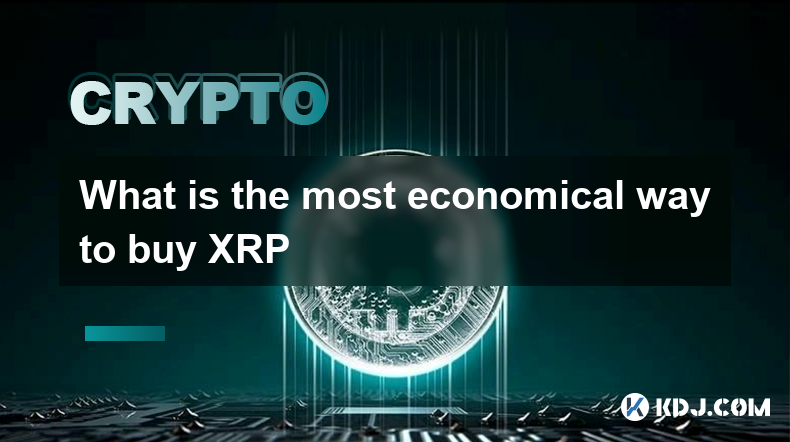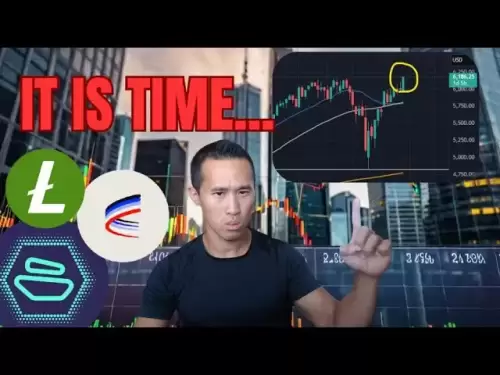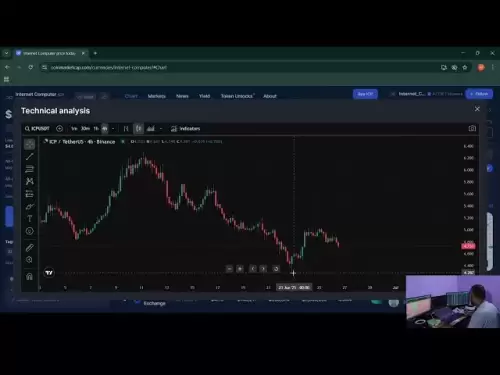-
 Bitcoin
Bitcoin $107,247.2038
-0.18% -
 Ethereum
Ethereum $2,424.7947
0.34% -
 Tether USDt
Tether USDt $1.0003
-0.02% -
 XRP
XRP $2.1171
-3.33% -
 BNB
BNB $645.6618
0.06% -
 Solana
Solana $141.5898
-1.32% -
 USDC
USDC $0.9998
0.00% -
 TRON
TRON $0.2710
-0.41% -
 Dogecoin
Dogecoin $0.1602
-2.99% -
 Cardano
Cardano $0.5553
-2.28% -
 Hyperliquid
Hyperliquid $36.3019
-2.42% -
 Bitcoin Cash
Bitcoin Cash $491.7212
2.04% -
 Chainlink
Chainlink $13.0810
-0.23% -
 Sui
Sui $2.6080
-5.06% -
 UNUS SED LEO
UNUS SED LEO $9.0040
-0.05% -
 Stellar
Stellar $0.2350
-3.06% -
 Avalanche
Avalanche $17.2294
-2.31% -
 Toncoin
Toncoin $2.8075
-1.05% -
 Shiba Inu
Shiba Inu $0.0...01121
-3.43% -
 Litecoin
Litecoin $84.2215
-0.32% -
 Hedera
Hedera $0.1429
-4.88% -
 Monero
Monero $312.2199
-0.90% -
 Dai
Dai $0.9997
-0.01% -
 Ethena USDe
Ethena USDe $0.9999
-0.02% -
 Polkadot
Polkadot $3.2973
-2.60% -
 Bitget Token
Bitget Token $4.4742
3.12% -
 Pi
Pi $0.5631
-10.10% -
 Uniswap
Uniswap $6.7817
-2.06% -
 Pepe
Pepe $0.0...09252
-3.74% -
 Aave
Aave $251.3830
-2.24%
What is the most economical way to buy XRP
To find the cheapest XRP, compare fees across exchanges like Binance and Coinbase, consider P2P platforms, and prioritize security and high trading volumes.
Mar 28, 2025 at 11:15 am

?
Finding the Cheapest XRP
Acquiring XRP at the lowest possible cost involves navigating several factors. The most economical method isn't universally the same for everyone; it depends on your location, the amount of XRP you're buying, and your comfort level with different platforms. Minimizing fees is key, but security and ease of use should also be considered.
Exchange Fees: The Major Cost Factor
Exchange fees are a significant factor in the overall cost. Different exchanges charge different fees, both for trading and for deposits/withdrawals. Some platforms offer lower trading fees for larger trade volumes, while others have flat fees regardless of the amount. It's crucial to research and compare the fee structures of multiple exchanges before committing to one. Look for exchanges that offer transparent fee schedules and clearly state all applicable charges.
Deposit and Withdrawal Fees
Beyond trading fees, consider the fees associated with depositing and withdrawing funds. Many exchanges charge fees for depositing fiat currency (like USD or EUR) and for withdrawing XRP to your personal wallet. These fees can add up, especially if you're making frequent transactions. Prioritize exchanges with low or no deposit fees and reasonable withdrawal fees for XRP.
Comparing Exchange Options
Several reputable cryptocurrency exchanges list XRP. Binance, Coinbase, Kraken, and Bitstamp are among the largest and generally offer competitive pricing and fees. However, regulations and availability vary by location, so you'll need to check which exchanges operate legally in your region. Always verify the exchange's legitimacy and security measures before depositing funds.
Using a Peer-to-Peer (P2P) Exchange
P2P exchanges, like those offered by LocalBitcoins or Paxful, allow you to buy XRP directly from other individuals. This can sometimes lead to lower fees compared to centralized exchanges, but it carries higher risks. You'll need to carefully vet your trading partner to avoid scams and ensure the transaction's security. P2P platforms usually offer escrow services to mitigate some of these risks.
The Role of Trading Volume
The volume of XRP being traded on an exchange can also impact the price. Higher trading volume generally leads to tighter spreads (the difference between the bid and ask price), resulting in a potentially more favorable price for you. Check the 24-hour trading volume of XRP on different exchanges before making your purchase.
Considering Trading Fees Structures
Exchanges employ different fee structures. Some charge a percentage of the trade value, others a flat fee, and some use a tiered system based on trading volume. A tiered system can be advantageous for frequent or large-volume traders. Carefully examine the fee structure to determine which is most cost-effective for your trading habits.
Understanding Maker and Taker Fees
Some exchanges differentiate between "maker" and "taker" fees. Maker fees apply when you add liquidity to the order book (placing a limit order), while taker fees apply when you remove liquidity (placing a market order). Understanding this distinction can help you optimize your trading strategy and minimize fees.
Minimizing Withdrawal Fees
Withdrawal fees can eat into your profits. Compare withdrawal fees across exchanges before selecting one. Some exchanges offer free or discounted withdrawals for certain cryptocurrencies during specific promotions. Keep an eye out for these opportunities.
Security Considerations
While focusing on cost is important, never compromise on security. Choose reputable and well-established exchanges with strong security measures, including two-factor authentication (2FA) and robust wallet protection. Avoid exchanges with a history of security breaches or questionable practices.
The Importance of Research
Before committing to any exchange, thoroughly research its reputation, fees, security features, and user reviews. Compare multiple exchanges to find the best fit for your needs and risk tolerance. Don't rush the process; taking the time to research will save you money and potential headaches in the long run.
Frequently Asked Questions
Q: Are there any completely free ways to get XRP?
A: No, there aren't any legitimate, completely free ways to obtain XRP. Any claims promising free XRP are likely scams. You must purchase XRP using fiat currency or other cryptocurrencies.
Q: Is it cheaper to buy XRP in bulk?
A: Potentially, yes. Some exchanges offer lower fees or better pricing for larger trade volumes. However, only buy what you can afford and are comfortable holding.
Q: What is the safest way to store my XRP after purchasing it?
A: The safest way is to store your XRP in a hardware wallet, a physical device specifically designed for secure cryptocurrency storage. Software wallets are less secure but more convenient. Never store significant amounts of XRP on an exchange.
Q: What should I do if I encounter a problem with an exchange?
A: Contact the exchange's customer support immediately. If you're unable to resolve the issue, you may need to seek legal advice or report the problem to the relevant authorities. Keep detailed records of all transactions and communications.
Q: How can I avoid scams when buying XRP?
A: Only use reputable exchanges and avoid unsolicited offers or promises of unrealistic returns. Verify the legitimacy of any exchange or individual before engaging in a transaction. Be wary of offers that seem too good to be true.
Disclaimer:info@kdj.com
The information provided is not trading advice. kdj.com does not assume any responsibility for any investments made based on the information provided in this article. Cryptocurrencies are highly volatile and it is highly recommended that you invest with caution after thorough research!
If you believe that the content used on this website infringes your copyright, please contact us immediately (info@kdj.com) and we will delete it promptly.
- MAGACOIN, Ethereum, and Dogecoin: Navigating the Crypto Landscape in 2025
- 2025-06-27 08:50:12
- Shiba Inu, Portfolio, and Cryptocurrency: Navigating the Meme Coin Mania in 2025
- 2025-06-27 08:30:12
- Quantum Threat, Bitcoin Encryption, Experts Warn: Is Your BTC Safe?
- 2025-06-27 08:50:12
- Wall Street Pepe (WEPE) Price Up: The Meme Coin Making Waves on Wall Street
- 2025-06-27 08:50:13
- Bitcoin Rises as Altcoins Slump: A New Era for Crypto?
- 2025-06-27 08:50:13
- Dogecoin's Wild Ride: Support Levels and Open Interest Under the Microscope
- 2025-06-27 08:55:12
Related knowledge

How to customize USDT TRC20 mining fees? Flexible adjustment tutorial
Jun 13,2025 at 01:42am
Understanding USDT TRC20 Mining FeesMining fees on the TRON (TRC20) network are essential for processing transactions. Unlike Bitcoin or Ethereum, where miners directly validate transactions, TRON uses a delegated proof-of-stake (DPoS) mechanism. However, users still need to pay bandwidth and energy fees, which are collectively referred to as 'mining fe...

USDT TRC20 transaction is stuck? Solution summary
Jun 14,2025 at 11:15pm
Understanding USDT TRC20 TransactionsWhen users mention that a USDT TRC20 transaction is stuck, they typically refer to a situation where the transfer of Tether (USDT) on the TRON blockchain has not been confirmed for an extended period. This issue may arise due to various reasons such as network congestion, insufficient transaction fees, or wallet-rela...

How to cancel USDT TRC20 unconfirmed transactions? Operation guide
Jun 13,2025 at 11:01pm
Understanding USDT TRC20 Unconfirmed TransactionsWhen dealing with USDT TRC20 transactions, it’s crucial to understand what an unconfirmed transaction means. An unconfirmed transaction is one that has been broadcasted to the blockchain network but hasn’t yet been included in a block. This typically occurs due to low transaction fees or network congestio...

How to check USDT TRC20 balance? Introduction to multiple query methods
Jun 21,2025 at 02:42am
Understanding USDT TRC20 and Its ImportanceUSDT (Tether) is one of the most widely used stablecoins in the cryptocurrency market. It exists on multiple blockchain networks, including TRC20, which operates on the Tron (TRX) network. Checking your USDT TRC20 balance accurately is crucial for users who hold or transact with this asset. Whether you're sendi...

What to do if USDT TRC20 transfers are congested? Speed up trading skills
Jun 13,2025 at 09:56am
Understanding USDT TRC20 Transfer CongestionWhen transferring USDT TRC20, users may occasionally experience delays or congestion. This typically occurs due to network overload on the TRON blockchain, which hosts the TRC20 version of Tether. Unlike the ERC20 variant (which runs on Ethereum), TRC20 transactions are generally faster and cheaper, but during...

The relationship between USDT TRC20 and TRON chain: technical background analysis
Jun 12,2025 at 01:28pm
What is USDT TRC20?USDT TRC20 refers to the Tether (USDT) token issued on the TRON blockchain using the TRC-20 standard. Unlike the more commonly known ERC-20 version of USDT (which runs on Ethereum), the TRC-20 variant leverages the TRON network's infrastructure for faster and cheaper transactions. The emergence of this version came as part of Tether’s...

How to customize USDT TRC20 mining fees? Flexible adjustment tutorial
Jun 13,2025 at 01:42am
Understanding USDT TRC20 Mining FeesMining fees on the TRON (TRC20) network are essential for processing transactions. Unlike Bitcoin or Ethereum, where miners directly validate transactions, TRON uses a delegated proof-of-stake (DPoS) mechanism. However, users still need to pay bandwidth and energy fees, which are collectively referred to as 'mining fe...

USDT TRC20 transaction is stuck? Solution summary
Jun 14,2025 at 11:15pm
Understanding USDT TRC20 TransactionsWhen users mention that a USDT TRC20 transaction is stuck, they typically refer to a situation where the transfer of Tether (USDT) on the TRON blockchain has not been confirmed for an extended period. This issue may arise due to various reasons such as network congestion, insufficient transaction fees, or wallet-rela...

How to cancel USDT TRC20 unconfirmed transactions? Operation guide
Jun 13,2025 at 11:01pm
Understanding USDT TRC20 Unconfirmed TransactionsWhen dealing with USDT TRC20 transactions, it’s crucial to understand what an unconfirmed transaction means. An unconfirmed transaction is one that has been broadcasted to the blockchain network but hasn’t yet been included in a block. This typically occurs due to low transaction fees or network congestio...

How to check USDT TRC20 balance? Introduction to multiple query methods
Jun 21,2025 at 02:42am
Understanding USDT TRC20 and Its ImportanceUSDT (Tether) is one of the most widely used stablecoins in the cryptocurrency market. It exists on multiple blockchain networks, including TRC20, which operates on the Tron (TRX) network. Checking your USDT TRC20 balance accurately is crucial for users who hold or transact with this asset. Whether you're sendi...

What to do if USDT TRC20 transfers are congested? Speed up trading skills
Jun 13,2025 at 09:56am
Understanding USDT TRC20 Transfer CongestionWhen transferring USDT TRC20, users may occasionally experience delays or congestion. This typically occurs due to network overload on the TRON blockchain, which hosts the TRC20 version of Tether. Unlike the ERC20 variant (which runs on Ethereum), TRC20 transactions are generally faster and cheaper, but during...

The relationship between USDT TRC20 and TRON chain: technical background analysis
Jun 12,2025 at 01:28pm
What is USDT TRC20?USDT TRC20 refers to the Tether (USDT) token issued on the TRON blockchain using the TRC-20 standard. Unlike the more commonly known ERC-20 version of USDT (which runs on Ethereum), the TRC-20 variant leverages the TRON network's infrastructure for faster and cheaper transactions. The emergence of this version came as part of Tether’s...
See all articles
























































































